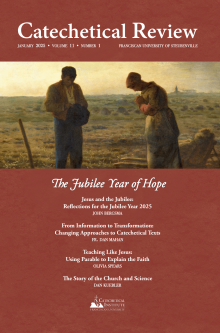 It was a predictably hot August day. We stood, tightly packed and shoulder-to-shoulder, in the blazing afternoon sun in the square outside the Basilica of St. Peter in Vatican City. It was the Great Jubilee year 2000, and I had helped lead a group of young people to World Youth Day. It was the largest gathering ever in St. Peter’s Square, which meant that we had to arrive many hours before Pope St. John Paul II was to arrive. The sun beat down mercilessly.
It was a predictably hot August day. We stood, tightly packed and shoulder-to-shoulder, in the blazing afternoon sun in the square outside the Basilica of St. Peter in Vatican City. It was the Great Jubilee year 2000, and I had helped lead a group of young people to World Youth Day. It was the largest gathering ever in St. Peter’s Square, which meant that we had to arrive many hours before Pope St. John Paul II was to arrive. The sun beat down mercilessly.
Several hours before the pope was to arrive, from our position far to the back, we could detect something happening up front. Vatican planners had anticipated the heat and its effects, and, to wild cheers, they were setting up what appeared to be a firehose. They began shooting the water high up into the air so that it would rain down cool relief on the crowd. They moved the hose closer and closer to the front, and the contrived rainstorm got closer and closer to our group. When we were finally in range, we reached forward with arms outstretched to the sky as deliciously refreshing water rained down upon us. I surprised myself when I noticed tears had come to my eyes. I wasn’t only grateful for the reprieve from the heat—I was moved by the compelling imagery of several hundred thousand young people, deeply conscious of their need for God, receiving the gift of water (seemingly from the heavens) right there in the heart of Christendom. It was a moment of the Jubilee that I have never forgotten. Water from the heavens. Relief and consolation. The presence of Jesus. The joy and exuberance of the young crowd.
By the time you’re reading this issue, the Jubilee Year 2025 will be underway. Jubilee Years have a long and beautiful history in the Church. Dr. John Bergsma has written a must-read article on the Jubilee for this issue giving us a detailed understanding of the Jubilee Year in the Old Testament, its fulfillment in the person of Jesus, and the importance of the Jubilee today.
There are two important facets of this Jubilee Year that I find particularly intriguing. For Catholics in the United States, we have been living several years of Eucharistic Revival, with the final year of missionary sending now underway (see Bishop James Wall’s excellent article also in this issue). This final year of the revival is converging with the beginning of the Jubilee Year, which seems to me to signal an especially important moment for American Catholics. There are so many compelling stories of renewal and conversion that have emerged from this time of intensified Eucharistic living. With a Jubilee Year beginning, the Church seems to be emphasizing the first priority of intentionally setting time aside to abide more deeply in God, to root ourselves more definitively in the Lord.
A second point stands out to me. Pope Francis has linked this Jubilee Year with the need for the Church to live in hope. In these very challenging days both culturally and ecclesially, we need the hope that can be found only in Christ. Each of us, of course, also carries our own hidden crosses—sufferings, wounds, anxieties—and in order to continue to bring others to the Gospel in a credible way as catechists, we need the Blessed Trinity. We Christians understand, in fact, that in the Cross of Jesus is to be found our definitive hope. This is because the darkness and violence of the Cross does not have the final word. Out of that darkness comes victory and unsurpassable joy.
In this Jubilee Year, the Church encourages us to be pilgrims of hope. This Jubilee can be for each of us a true pilgrimage, one in which we move more intently toward a life lived in Christ. Pope Benedict, perhaps, put it best: “a distinguishing mark of Christians . . . is not that they know the details of what awaits them, but they know in general terms that their life will not end in emptiness.” The source of all Christian hope is this deepest conviction: “I am definitively loved and whatever happens to me—I am awaited by this Love.”[1]
This year, consider ways the graces of the Jubilee might be unleashed in your life. Make a pilgrimage. Set aside more time for prayer and Scripture study. Live your sacramental life more deeply. Release another from the burden of their debt to you, perhaps by offering them your forgiveness and mercy. Living the Jubilee Year in this way is sure to be pleasing to our Heavenly Father, who rains down “all good giving and every perfect gift . . . from above” (Jas 1:17).
[1] Pope Benedict XVI, Spe Salvi, nos. 2, 3.
Art Credit: St. Peter’s Square, Adobe Stock.
This article is from The Catechetical Review (Online Edition ISSN 2379-6324) and may be copied for catechetical purposes only. It may not be reprinted in another published work without the permission of The Catechetical Review by contacting [email protected]


















